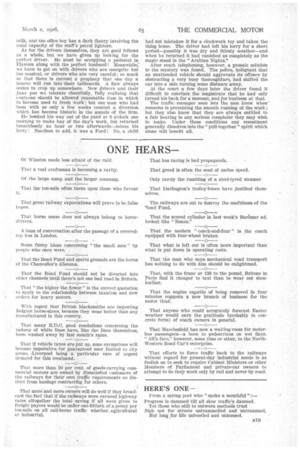ONE HEARS
Page 3

If you've noticed an error in this article please click here to report it so we can fix it.
Of Winston made less afraid of the raid.
That a real craftsman is becoming a rarity.
Of the large sump and the larger consump.
That the ton-mile often turns upon those who favour.
it.
That great railway expecta• tions will prove to be false hopes.
That horse sense does not always belong to hersed rivers.
A buzz of conversation after the passage of a coveredtop bus in London.
Some funny ideas concerning "the small men" by, people who once were.
That the Road Fund and sp• orts grounds are the horns of the Chancellor's dilemma.
That the Road Fund sho• uld not be diverted into other channels until there's not one bad road in Britain.
That "the higher the fewer" is the correct quotation to apply to the relationship between taxation and new orders for heavy motors.
With regret that British blacksmiths are importing Belgian horse-shoes, because they wear better than any manufactured in this country.
That many R.D.C. good resolutions concerning the upkeep of white lines have, like the lines themselves, been washed away by last month's rains.
That if vehicle taxes are put up, zone exemptions will become imperative for guaranteed user, limited to city areas, .Liverpool being a particular case of urgent demand for this treatment.
That more than 50 per cent. of goods-carrying commercial motors are owned by dissatisfied customers of the railways for their own traffic requirements as distinct from haulage contracting for others.
That more and more owners will do well if they broadcast the fact that if the railways were excused highway rates altogether the total saving if all were given to freight payers would be under one-fiftieth of a penny per ton-mile on all rail-borne traffic 'svhether_.agricultural or industrial. That bus racing is bad propaganda.
That greed is often the seed of undue speed.
Only rarely the rumbling of a steel-tyred steamer That Darlington's trolley-buses have justified themselves.
The railways are out to destroy the usefulness of the Road Fund.
That the scored cylinder in last week's Barimar ad. looked like " Borizo."
That the modern " coach-and-four " is the coach equipped with four-wheel brakes.
That what is left out is often more important than what is put down in operating costs.
That the man who says mechanical road transport has nothing to do with him should be enlightened.
That, with the franc at 138 to the pound, Britons in Paris find it cheaper to taxi than to wear out shoeleather.
That the engine capable of being removed in four minutes suggests a new branch of business for the motor thief.
That anyone who could accnrately forecast Easter weather would earn the gratitude (probably in concrete form) of coach owners in general.
That Macclesfield has now a waiting-room for motorbus passengers—a boon to pedestrians on wet days. "All's fare," however, some time or other, to the NorthWestern Road Car's enterprise.
That efforts to force traffic back to the railways without regard for present-day industrial needs is as foolish as to seek to require Cabinet Ministers or other Members of Parliament and private-car owners to attempt to do their work only by rail and never by road.




























